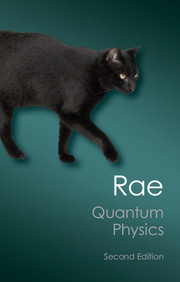Book contents
- Frontmatter
- Dedication
- Contents
- Preface to the first edition
- Preface to the second edition
- 1 Quantum physics
- 2 Which way are the photons pointing?
- 3 What can be hidden in a pair of photons?
- 4 Wonderful Copenhagen?
- 5 Is it all in the mind?
- 6 Many worlds
- 7 Is it a matter of size?
- 8 Backwards and forwards
- 9 Only one way forward?
- 10 Can we be consistent?
- 11 Illusion or reality?
- Further reading
- Index
7 - Is it a matter of size?
Published online by Cambridge University Press: 05 February 2014
- Frontmatter
- Dedication
- Contents
- Preface to the first edition
- Preface to the second edition
- 1 Quantum physics
- 2 Which way are the photons pointing?
- 3 What can be hidden in a pair of photons?
- 4 Wonderful Copenhagen?
- 5 Is it all in the mind?
- 6 Many worlds
- 7 Is it a matter of size?
- 8 Backwards and forwards
- 9 Only one way forward?
- 10 Can we be consistent?
- 11 Illusion or reality?
- Further reading
- Index
Summary
The last two chapters have described two extreme views of the quantum measurement problem. On the one hand it was suggested that the laws of quantum physics are valid for all physical systems, but break down in the assumed non-physical conscious mind. On the other hand the many-worlds approach assumes that the laws of physics apply universally and that a branching of the universe occurs at every measurement or measurement-like event. However, although in one sense these represent opposite extremes, what both approaches have in common is a desire to preserve quantum theory as the one fundamental universal theory of the physical universe, able to explain equally well the properties of atoms and subatomic particles on the one hand and detectors, counters and cats on the other. In this chapter we explore an alternative possibility, that quantum theory may have to be modified before it can explain the behaviour of large-scale macroscopic objects as well as microscopic systems. We will require that any such modification preserves the principle of weak reductionism discussed towards the end of Chapter 5.
The first point to be made is that the problems we have been discussing seem to make very little difference in practice. As we emphasised in Chapter 1, quantum physics has been probably the most successful theory of modern science. Wherever it can be tested, be it in the exotic behaviour of fundamental particles or the operation of the silicon chip, quantum predictions have always been in complete agreement with experimental results.
- Type
- Chapter
- Information
- Quantum PhysicsIllusion or Reality?, pp. 88 - 100Publisher: Cambridge University PressPrint publication year: 2012



